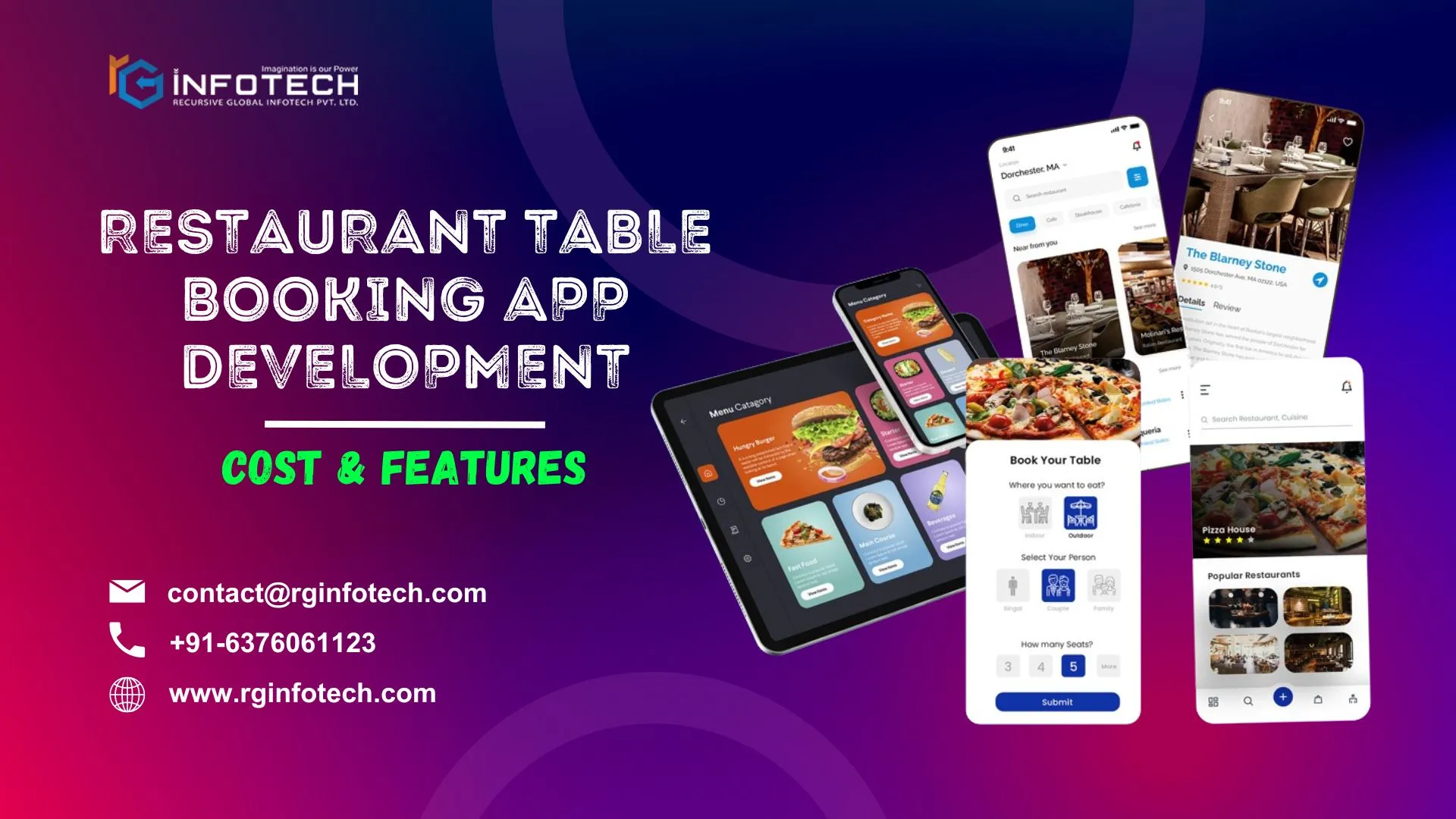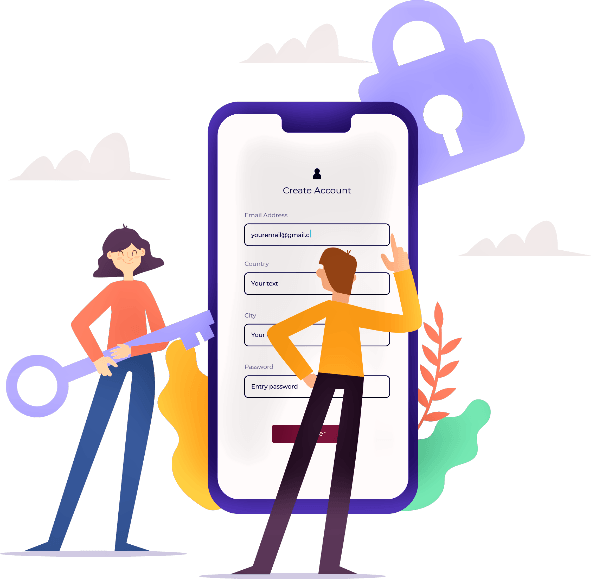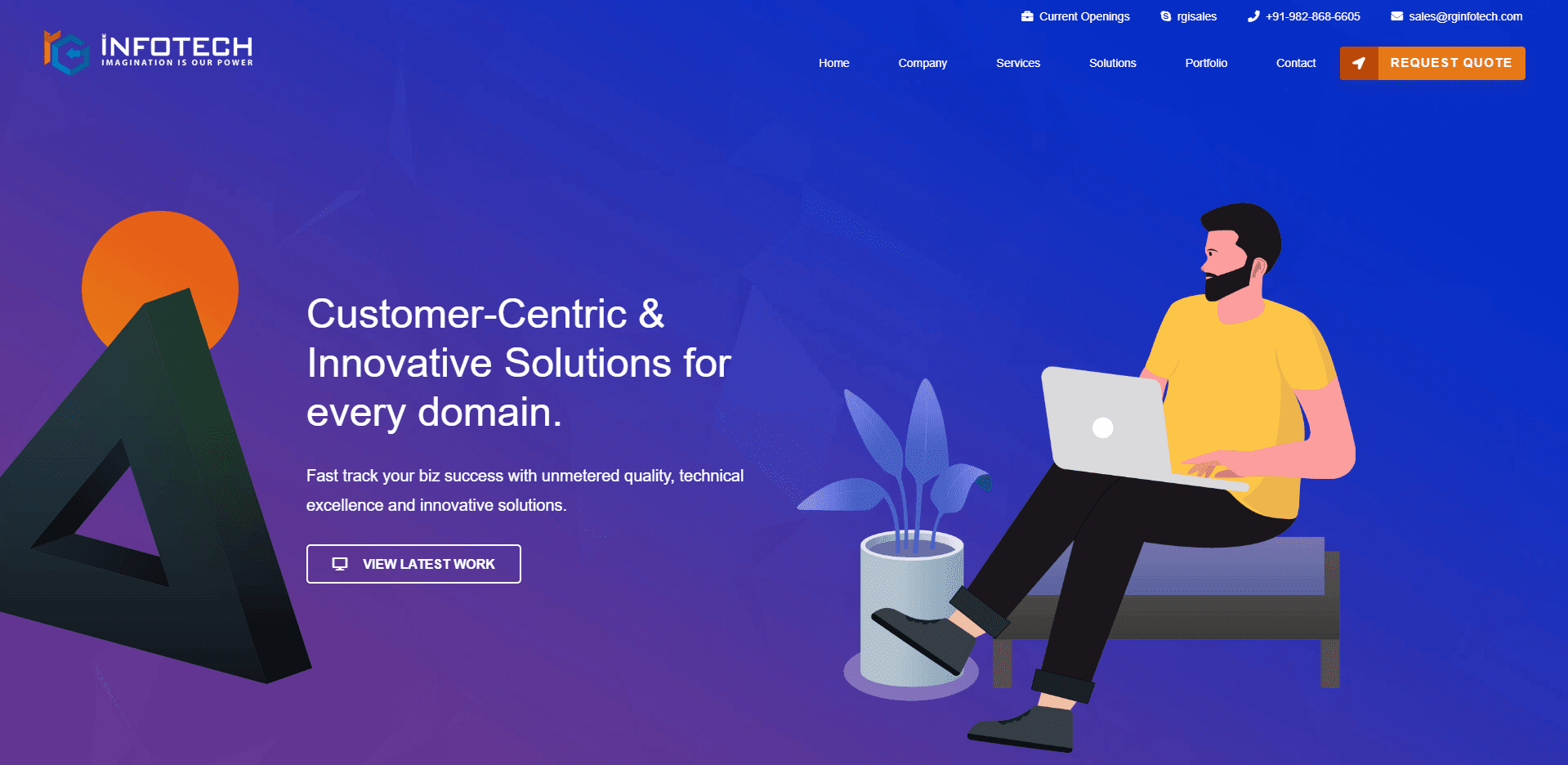Restaurant Table Booking App Development Company

If you own a restaurant then you must be aware of the long time durations and challenges you need to face to manage reservations. This is why mobile apps for restaurants are one of the most useful tools for businesses that have limited budgets to take the popularity of the dining business to the top level. Table booking apps are more convenient for users when it comes to ordering food via online payment methods. In today’s blog, we’ll discuss the cost, features, and other important aspects of restaurant table booking app development.
What is A Restaurant Table Booking App?
A restaurant table booking app is a platform that allows restaurants and cafe owners to manage table booking and reservations effectively. From a customer’s perspective, it allows them to book a table at their favorite dining place, and from the restauranteur’s view, they’ll be able to manage their booking efficiently and keep track of customers coming in and when. Overall, these reservation apps for restaurants contribute to a seamless and more enjoyable dining experience for all the associated parties.
What Are The Benefits of a Restaurant Table Booking App?
There are several benefits of choosing restaurant reservation apps. Firstly, there’s no need for customers to stand in long queues outside the restaurant and that’s its biggest advantage. Not only that, it also briefs restaurants regarding the expected amount of patrons for the day, so they can plan their staffing and menus accordingly and properly. Last but not least, it helps reduce food waste, which is a big concern for many restaurants. Here we’ve mentioned other important benefits of a restaurant table booking app for customers and restaurateurs.
Benefits for Customers
-
-
-
- Review and Criticism of the Text: One of the main benefits is that guests can see the ratings and reviews left by previous customers, which gives the info about the restaurant’s hygiene, meal quality, serving approach, and other important criteria so that customers can make quick judgments.
- Order Food in Advance: Visitors who know what they want to eat can place a pre-order effortlessly. It saves their time of waiting around for someone to come get their order, and kitchen staff can begin essential preparations
- Avoid Making Calls to Save Time: To book a table, know the menu, and provide any specific instructions that might be important, etc., customers don’t have to place a call to the restaurant. They can do this simply with the help of restaurant reservation booking applications because all the data is already present in the restaurant table reservation app.
-
-
Benefits for Restaurants
-
-
-
- Excellent Customer Service: It provides users with the information they need from the app that helps restaurants in providing a seamless experience to their customers. It enables restaurants to provide customers with all the items they may need while booking a reservation.
- Make Reservations At All Times: The mobile app makes it easier to accept requests for reservations 24/7. Customers can make a booking whenever they want, and depending on their availability, you can either accept or decline them.
- Online Menu Provision: Restaurants can provide whole cuisine through the app so that customers can look it up and place preorders while looking for reservations if they need to. This helps reduce food waste and enables kitchen personnel to prepare essential materials in advance.
- Encourage Loyalty Initiatives: To strengthen your restaurant business, conduct focused marketing and provide the necessary discounts. You can also provide discounts to your customers, send notifications for first-paid customers, etc.
-
-
Now that we’ve learned about the benefits of these apps, let’s shift our focus to the global restaurant reservation market statistics and see more exciting data and info.
Market Statistics of Restaurant Table Booking App
The global restaurant reservation software market is experiencing significant growth, driven by the increasing demand for efficient restaurant management systems. According to experts, 70% percent of respondents admit that they’d use an app to order and 65% to pay. Most Gen Z adults, millennials, and Gen Zers would tap a smartphone app in their limited-service restaurant experience. 42% of limited-service operators noted they plan to invest in contactless or mobile pay tech in 2024.
Current Trends in Restaurant Reservations
-
-
-
- Digital Transformation: It marks the increased demand for restaurant reservation apps and online booking platforms. Customers now prefer the convenience of browsing and reserving tables online, adding to the digitization of restaurant operations.
- Personalization: With the help of artificial intelligence (AI), restaurant reservation platforms can offer more personalized recommendations according to customer’s preferences.
- Integration with POS Systems: Seamless integration between restaurant reservation systems and point-of-sale (POS) systems is becoming quite popular. This integration streamlines operations by synchronizing reservation data with table management and payment processing.
- Flexibility in Policies: Issue more lenient policies to cancel reservations and accommodate changing plans. Understanding the unpredictability of current times, many establishments are considering more lenient cancellation terms for such uncertainties.
-
-
Target Audience and Market Research
-
-
-
- Diners: Research focuses on understanding customer’s booking preferences and dining experiences to enhance user-friendly interfaces and personalized booking options.
- Restaurateurs: Recognizing the requirements such as optimizing turnover and managing peak hours informs the development of personalized reservation management tools.
- Industry Stakeholders: It gives valuable insight into current market trends and growth opportunities that help investors, associates, and regulators in making uninformed decisions.
- User Experience: User research and feedback are important factors in improving the usability of any brand or service, including the restaurant reservation system.
- Market Segmentation: Knowing the demographics and preferences of customers helps in creating customized features and strategies for effective market and audience targeting.
-
-
Features of Restaurant Table Booking App Development
Here’s the list of some exciting features that you should include in the mobile app development to create seamless table reservation apps:
User Features (Customer App)
-
-
-
- Search and Discovery: The system should offer a strong search and discovery experience, allowing users to find their favorite restaurants easily. This includes advanced search filters for location tracking, cuisine type, price range, and user ratings.
- Real-Time Table Availability: This feature offers accurate and latest details to users regarding available tables. By incorporating this feature, the restaurant reservation system solution can offer real-time updates on available tables, enabling users to make better booking decisions.
- Booking and Management: A user-friendly interface is important to enhance the booking experience while a centralized dashboard for restaurateurs enables efficient booking management. It includes adding, modifying, or canceling reservations, etc.
- Reviews and Ratings: User-generated reviews and ratings play an important role in changing dining decisions. Incorporating reviews and rating features into your app enables users to make better choices depending on the experiences of others.
- Loyalty Programs Integration: Implementing a loyalty program, frequent diners with discounts, and special offers can enhance user engagement and promote repeat business.
- Mobile Payments: It enables users to make payments securely through the reservation app. It offers convenience and streamlines the process of table booking which enhances the user experience.
- Social Media Integration: This feature enables users to share their dining plans and experiences on social media platforms through the reservation app. It incorporates social media features, improves user engagement, promotes user-generated content, and increases restaurants visibility.
-
-
Restaurant Management Features (Admin Panel)
-
-
-
- Table Management and Floorplan: The table management and floorplan tools allow administrators to develop and customize digital floor plans customized according to their restaurant layout.
- Reservation Management System: It acts as a center for handling all reservation-related tasks. Administrators can access a comprehensive dashboard to seamlessly manage reservations, including functionalities such as automated reminders and confirmations.
- Analytics and Reporting: The system offers strong analytics and reporting abilities, providing valuable insights into reservation trends, rates of table occupancy, and user behavior.
- Marketing and Promotions: Marketing and promotions are important tools to manage promotions, integrating with e-mail marketing, and using social media platforms to increase visibility.
-
-
Restaurant Table Booking App Development Process
If you want to Develop a Restaurant Reservation App for your business, you need to consider the following steps:
Defining App Requirements and Scope
-
-
-
- Gather information and requirements through stakeholder meetings, market research, and user feedback.
- Next is to define the scope, including key features, target audience, platforms (iOS, Android), and technical requirements.
- Create user stories, project layouts, and wireframes to outline the functions of the app and the timeline of development.
-
-
Design and User Interface (UI/UX)
-
-
-
- Once you’re done gathering the data, it’s time for restaurant table booking app design. Designers need to design an intuitive and appealing user interface and user experience for the app that is aligned with brand identity.
- Restaurant table reservation system design experts develop prototypes and wireframes to get an idea of the layout of the application and navigation flow.
- Designers need to properly test the app and gather feedback from potential users to refine the UI/UX design.
-
-
App Development (Native vs. Cross-Platform)
Testing and selecting the restaurant table booking app development approach depending on the requirements of the project, budget, and target audience.
-
-
-
- Native Development: This approach Involves developing separate versions of the app customized according to each platform using platform-specific languages and tools. To develop an IOS app, developers use Swift or Objective-C, But when it comes to restaurant table booking app development Android, developers prefer Java or Kotlin.
- Cross-Platform Development: This includes frameworks such as Flutter, React Native, or Xamarin to make a single codebase that supports multiple devices and platforms. It helps them to write code once and deploy it on various platforms like iOS or Android.
-
-
Testing and Deployment:
-
-
-
- After the development, it’s time to test the app thoroughly to ensure the hotel table booking app operates well, and safe from cyber threats, and bugs, and is error-free.
- To validate the functionality and usability of the app, testers perform unit testing, user acceptance testing, and integration testing.
- Address any issues identified during testing and iterate on the development as needed.
- After completing the testing process, the app is ready for deployment by packaging it for distribution through app stores (e.g. Google Play Store, Apple Store).
- Deploy the app to production environments and monitor its performance post-launch.
-
-
Restaurant Table Booking App Development Cost Estimation and Considerations
Based on the provided breakdown of development hours and their associated costs, the total cost of developing an integrated restaurant reservation software solution for table reservations can be calculated as follows:
-
-
-
- Technical Documentation: 40 hours – $1000 to $2000
- Front-End and Back-End Development: 80-150 hours – $10,000 to $20,000
- UI/UX Design: 60 hours – $1500 to $3000
- Testing: 80 hours – $2000 to $4000
- Total Development Cost: $14,500 to $29,000
-
-
Therefore, the estimated cost of restaurant app development with critical features can range from $14,500 to $29,000 for a specific platform. If the application includes additional features and follows industry best practices, the cost can increase to around $35,000.
Factors Affecting The Cost of Restaurant Booking App Development
The cost of restaurant app development from basic to advanced can vary greatly depending on several factors, but here’s a general idea:
-
-
-
- Simple app with basic features: $5,000 – $15,000
- App with online ordering and delivery: $20,000 – $1,00,000+
-
-
Here are some of the main factors that influence the cost:
-
-
-
-
- App Size: App size is one of the most important factors that can affect the restaurant app development cost. If you want to develop a large app then the cost of development might be a little high.
- Features and Functions: It is another crucial element that can affect the restaurant table booking app development cost. For more accurate cost estimates, you can ask your mobile app development company depending on the features and functionalities.
- Development Team: Believe it or not, this factor can highly influence the restaurant app development cost. You need to include this factor when it comes to calculating the overall development cost.
- Platform and Devices: The selection of platforms and devices is also an important feature that affects the cost of restaurant app development. It is obvious that if you can develop an app for a single platform then the cost will be comparatively less than developing an app for several platforms.
- App Maintenance Cost: The app maintenance cost typically ranges from 15% to 20% of the overall development cost per year. However, the actual costs will differ depending on the specific requirements and circumstances of the app.
- Tech Stack Cost: Selecting the tech stack is also a very important factor that contributes to restaurant app development costs. It helps in determining the number of technologies, programming languages, and basic layout of the app.
-
-
-
Pricing Models of Online Restaurant App
Pricing models for software development, such as for a restaurant reservation app, typically include fixed cost and hourly rate models:
Fixed Cost Model
In a fixed-cost model, the total project cost is predetermined based on the project scope and requirements. There’s a fixed amount that clients have to pay for the entire project, no matter what the actual time or resources the government spent on the development team.
Hourly Rate Model
In an hourly rate model, clients pay for the actual time spent by the development team on the project. The hourly rate is typically based on the skill level and expertise of the Restaurant App Developers involved in the project.
Ultimately, the most suitable pricing model should be selected based on the specific needs and circumstances of the project and the client.
Conclusion
The above-provided details and information talk about Restaurant table booking app development. It highlights the important aspects of app development including the cost and features. These factors empower them to create successful applications that meet the expectations of diners and restaurant owners in the ever-evolving hospitality industry. RG Infotech provides on demand restaurant app development or website development services as per your needs.
Frequently Asked Questions (FAQs)
Restaurant booking apps benefit restaurant owners by streamlining the reservation process, reducing no-shows, maximizing table utilization, and enhancing customer satisfaction through convenient booking options.
Building a restaurant table booking app can cost from $5,000 to over $1,00,000 depending on various factors. A simple app with basic features may cost from $5,000 to 15,000, while more complex apps with advanced functionalities can range from $20,000 to $1,00,000 Or more.
The development time can vary depending on the complexity of features, restaurant booking system design requirements, and the expertise of the application development team. Basically, it may take from a few weeks to several months to build a fully functional app.



 rgisales
rgisales



